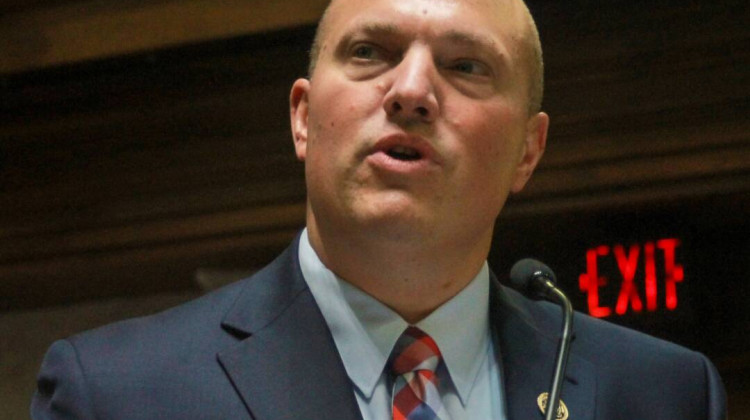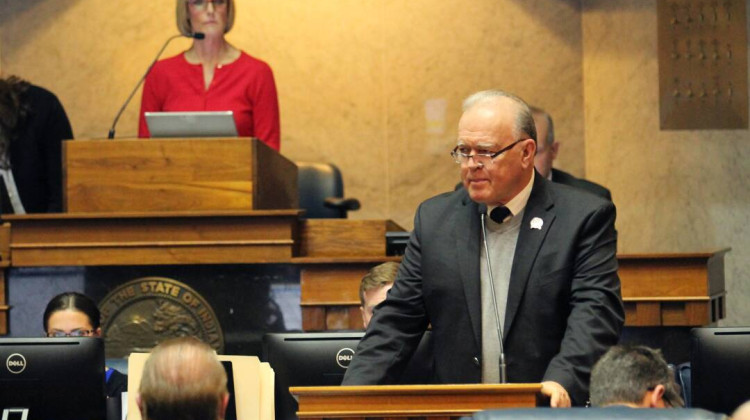Indiana passed controversial legislation restricting transgender youth’s access to health care in 2023.
The statehouse also considered a failed bill last year that would have prevented courts from allowing the Indiana Department of Child Services to remove children from homes that do not support their gender identity or access to gender-affirming care.
The bill featured a court case between DCS and the parents of a transgender child — named A.C. in court records.
In the case, DCS was represented by the Office of the Indiana Attorney General. The parents were represented by Becket Law, a firm that has successfully argued for religious liberty in Supreme Court cases concerning LGBTQ and reproductive rights. The parents are now appealing to the U.S. Supreme Court after lower courts sided with DCS.
WFYI’s Zak Cassel spoke with IndyStar investigative reporter Kristine Phillips, who has been watching the case, to learn more.
This transcript has been edited for length, clarity and style.
Zak Cassel: So tell us about the case.
Kristine Phillips: The case is about this couple from Anderson, Ind., named Mary and Jeremy Cox. They are deeply religious and devout Christians. They believe that children should be raised based on their sex at birth, and using pronouns and names that are opposite to their sex at birth is immoral and harmful.
This all kind of started in 2019 when their teenage child came out to them and said that she identifies as a girl. Shortly after that, DCS received a report alleging that there was some abuse — verbal and emotional abuse at the home — regarding A.C.’s gender identity. So in 2021, the Coxes lost custody of A.C. DCS conducted an investigation.
A court in Madison County ruled that A.C. should be taken out of the home and into the custody of DCS. What the court said was that A.C. had developed a severe eating disorder that was tied to the conflict with her parents. The Coxes lost custody of A.C. back in 2021. She was 16 years old. The Coxes then appealed to the Indiana Court of Appeals to try to get custody back. What the Court of Appeals ruled is that the parents’ rights were not violated.
At the heart of the Coxes’ argument is that they have every right as parents to raise their child however they see fit, to express their religious views, and that’s their Constitutional right as parents. They also argue that these allegations of abuse that came out earlier were dismissed and were never substantiated.
The Court of Appeals ruled that their rights were not violated. One powerful quote from the Court of Appeals ruling is that yes, parents have the right to express their religious beliefs, but they don’t have the right to exercise them in a way that would harm their child.
In the state appeals court, the Coxes lost. They tried to get the Indiana Supreme Court to take their case, but they also lost.
Cassel: What are some of the arguments that DCS is making in the case?
Phillips: DCS is represented by the Indiana Attorney General’s Office. They made a far less controversial argument. The reason that A.C. was taken away from the Coxes was not because of this conflict over gender identity and religious beliefs. Rather, it was because of this severe eating disorder that was developed because of the conflict with the parents. The argument is that this eating disorder will get worse if she was placed back in the custody of her parents.
The other thing they’re arguing is that the case is now moot. It’s not relevant anymore because A.C., when this all started, was 16 years old. That was in 2021. Now she’s an adult and the custody case is actually closed.
What the Coxes are saying is that even if their daughter is now an adult, this case could have wide ramifications for religious parents across the country.
Cassel: What’s at stake for transgender youth?
Phillips: It’s in conflict with the rights of transgender youth — whether they can express themselves, whether they can use the right pronouns and names according to their gender identity. And the Indiana legislature has passed bills that go after gender affirming care, laws that would require teachers to notify parents about students who want to be referred to by a different name or a different pronoun. So it touches on a lot of the issues of transgender rights.
Cassel: Where does the case stand now and what’s next?
Phillips: The Indiana Attorney General’s Office filed a brief with the U.S. Supreme Court, earlier this month, and then shortly after that, the Coxes filed another brief. Right now, we’re just waiting for the Supreme Court to decide whether or not to take the case. The Supreme Court gets about ten thousand of these petitions every year and they take a very small fraction of that, less than one percent.
Cassel: Thank you so much, Kristine.
Contact WFYI’s Investigative Data Journalist Zak Cassel at zcassel@wfyi.org.
 DONATE
DONATE







 Support WFYI. We can't do it without you.
Support WFYI. We can't do it without you.